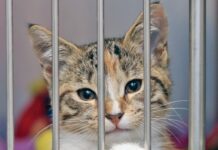In an effort to see what difference diet might make to an obese cat’s blood glucose control, researchers fed three diets—one high in carbohydrates, one high in fats, and one high in protein—to healthy-weight and obese cats and measured plasma levels of glucose, insulin, free fatty acids, and triglycerides. The study, published by BMC Veterinary Research, was done at the University of Zurich.
The diets met established nutritional needs of an adult cat. The cats—4- to 5-year-old intact males; six overweight and seven lean—were fed amounts of food to correspond with bodyweight, with adjustments made after each meal according to any leftovers.
The researchers found no significant difference in metabolic response between the two groups. However, the high-carb diet caused the highest blood insulin levels, although cats with genetic obesity did regain insulin sensitivity after losing weight.



